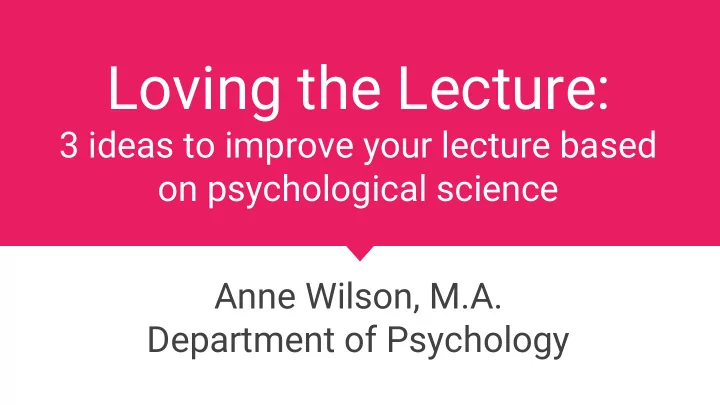

Loving the Lecture: 3 ideas to improve your lecture based on psychological science Anne Wilson, M.A. Department of Psychology
Is active learning ALWAYS better than lecturing?
It depends.
When would YOU want or need to lecture?
Is good lecturing better than bad lecturing?
How can YOU make great lectures?
Great lectures
1. Tell a story 2. Use visual aids Great lectures effectively 3. Consider the audience
1. Tell a story 2. Use visual aids Great lectures effectively 3. Consider the audience
1. Tell a story 2. Use visual aids Great lectures effectively 3. Consider the audience
1. Tell a story 2. Use visual aids Great lectures effectively 3. Consider the audience
What was your favorite childhood book or story?
What was the lesson of that story?
Raise your hand if you remembered the lesson of the story.
Keep your hand raised if it has been more than 1 year since you read the story
Keep your hand raised if it has been more than 5 years since you read the story
Keep your hand raised if it has been more than 10 years since you read the story
Stories are meaningful and memorable
DINNER NERVE TEACHER FLOOD BARREL RATTLE VESSEL HARBOR ARTIST CASTLE
DINNER NERVE TEACHER FLOOD GROUP 1: BARREL RATTLE “MEMORIZE THESE WORDS” VESSEL HARBOR ARTIST CASTLE
DINNER NERVE TEACHER FLOOD GROUP 2 BARREL RATTLE “CONSTRUCT A STORY VESSEL HARBOR USING THESE WORDS” ARTIST CASTLE
One night at DINNER , I had the NERVE to bring my TEACHER . There had been a FLOOD that day, and the rain BARREL was sure to RATTLE . There was, however, a VESSEL in the HARBOR carrying this ARTIST to my CASTLE .
% of words recalled Control Narrative
% of words recalled Control Narrative
% of words recalled Control Narrative
How can YOU create story-like lectures?
Define a unified meaning or message to be supported by the “action” of your lecture
Select a sequence of content to support that meaning or message.
Make the lecture story memorable by using stories
Memory does not work like a video camera!
Memories are reconstructed , or rebuilt, out of stored elements
What can go wrong during this process?
Where can you find stories?
Use your own stories
Use students’ stories
Use studies as stories
Use others’ stories
1. Tell a story 2. Use visual aids Great lectures effectively 3. Consider the audience
Multimedia Principle people learn better from words & pictures than from words alone
Cognitive Load the amount of information you are trying to process at any one time
How can you reduce cognitive load?
Coherence Principle people learn better when extraneous material is excluded
Signaling Principle providing cues for how to process information enhances learning
Do these principles enhance student learning?
% correct on midterm Intro to Child Life Epidemiology
% correct on midterm Intro to Child Life Epidemiology
% correct on midterm Intro to Child Life Epidemiology
How can YOU use visual aids effectively?
Guide students attention
Stress can sometimes be a good thing
Use visuals to signal structure
Types of Long Term Memory ● Declarative (Explicit) ○ Semantic ○ Episodic ● Nondeclarative (Implicit) ○ Procedural ○ Priming ○ Classical Conditioning
Keep it simple , stupid
Does this bring me joy?
Does this enhance my message ?
1. Tell a story 2. Use visual aids Great lectures effectively 3. Consider the audience
https://soundcloud.com/whyy-the-puls e/an-audio-illusion
Theory of Mind to understand that others have beliefs, desires, and knowledge that may differ from one's own
False Belief Task
How can you consider the audience?
Assess students’ existing knowledge
Lay the foundation with facts
Make connections to what students already know
1. Tell a story 2. Use visual aids Great lectures effectively 3. Consider the audience
Thank you! Questions?
Resources & References
Recommend
More recommend